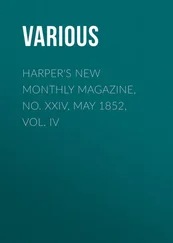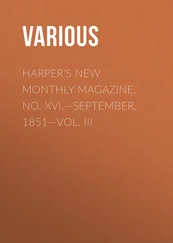Various - Harper's New Monthly Magazine, No. VII, December 1850, Vol. II
Здесь есть возможность читать онлайн «Various - Harper's New Monthly Magazine, No. VII, December 1850, Vol. II» — ознакомительный отрывок электронной книги совершенно бесплатно, а после прочтения отрывка купить полную версию. В некоторых случаях можно слушать аудио, скачать через торрент в формате fb2 и присутствует краткое содержание. Издательство: Иностранный паблик, Жанр: periodic, foreign_edu, на английском языке. Описание произведения, (предисловие) а так же отзывы посетителей доступны на портале библиотеки ЛибКат.
- Название:Harper's New Monthly Magazine, No. VII, December 1850, Vol. II
- Автор:
- Издательство:Иностранный паблик
- Жанр:
- Год:неизвестен
- ISBN:нет данных
- Рейтинг книги:4 / 5. Голосов: 1
-
Избранное:Добавить в избранное
- Отзывы:
-
Ваша оценка:
- 80
- 1
- 2
- 3
- 4
- 5
Harper's New Monthly Magazine, No. VII, December 1850, Vol. II: краткое содержание, описание и аннотация
Предлагаем к чтению аннотацию, описание, краткое содержание или предисловие (зависит от того, что написал сам автор книги «Harper's New Monthly Magazine, No. VII, December 1850, Vol. II»). Если вы не нашли необходимую информацию о книге — напишите в комментариях, мы постараемся отыскать её.
Harper's New Monthly Magazine, No. VII, December 1850, Vol. II — читать онлайн ознакомительный отрывок
Ниже представлен текст книги, разбитый по страницам. Система сохранения места последней прочитанной страницы, позволяет с удобством читать онлайн бесплатно книгу «Harper's New Monthly Magazine, No. VII, December 1850, Vol. II», без необходимости каждый раз заново искать на чём Вы остановились. Поставьте закладку, и сможете в любой момент перейти на страницу, на которой закончили чтение.
Интервал:
Закладка:
"I am rejoiced to see your majesty."
"Keep the secret from every one, even from your master," was the reply, and the faithful creature rendered implicit obedience. He, and Mrs. Jane Lane, constituted Charles's Privy Council at Bristol. No ship being likely to sail from that port for a month to come, the king considered it dangerous to remain there so long. He therefore repaired to the residence of Colonel Wyndham, in Dorsetshire, where he was affectionately welcomed by that loyal cavalier and his lady, who had been his nurse. The venerable mother of the colonel, though she had lost three sons and one grandchild in his service, considered herself only too happy to have the honor of receiving him as her guest.
Finally, after adventures too numerous to be recorded here, the fugitive king succeeded in securing a passage toward the end of October, in a little bark from Shoreham to Dieppe, where he landed in safety, more than forty persons, some of them in very humble circumstances, having been instrumental to his escape, not one of whom could be induced by the large reward offered by the Parliament for his apprehension, to betray him.
A certain eloquent Scotch essayist, who endeavors to apologize for the conduct of Algernon Sidney, and other worthies of his party, in accepting the bribes of France by impugning the integrity of the English character, and goes so far as to express a doubt whether there were an honest man to be met with at that epoch, save Andrew Marvel, appears to have forgotten the glorious instances of stainless honesty and virtue afforded by the Penderel brothers, and other noble men of all degrees, who proved themselves superior to all temptations that could be offered.
When England had, by general acclamation, called home her banished king, the five Shropshire brothers were summoned to attend him at Whitehall, on Wednesday, the 13th of June, 1661, when his majesty was pleased to acknowledge their faithful services, and signified his intention of notifying his gratitude by a suitable reward, inquiring if they had any particular favor to ask. They only asked an exemption from the penal laws, with liberty for themselves and their descendants to enjoy the free exercise of their religion, being members of the Romish church. This request was granted, and their names, together with those of their kinswoman Mrs. Yates, Mr. Huddleston, and Mr. Whitgreave, were especially exempted in the statute from the pains and penalties of recusancy.
King Charles granted a moderate pension to them and their descendants for ever.
"The Oak," says a contemporary, whose pleasant little chronicle of Boscobel was published in 1660, the year of the restoration, "is now properly called 'The Royal Oake of Boscobel,' nor will it lose that name while it continues a tree: and since his majesty's happy restoration that those mysteries have been revealed, hundreds of people for many miles round, have flocked to see the famous Boscobel, which, as you have heard, had once the honor to be the palace of his sacred majesty, but chiefly to behold the Royal Oake, which has been deprived of all its young boughs by the visitors of it, who keep them in memory of his majesty's happy preservation."
Charles himself subsequently made a pilgrimage to the scene of his past troubles: when he visited the Royal Oak, he was observed to gather a handful of the acorns. Some of these he planted with his own hand in Saint James's Park. A promising young tree, which sprang from one of these acorns, which Charles had planted in the queen's pleasure garden, within sight of his bed-chamber, in Saint James's Palace, and was accustomed to water and tend with great pleasure, was called the King's Royal Oak, and had become an object of interest to the people as a relic of that popular sovereign; but was destroyed by Sarah, Duchess of Marlborough, as soon as her husband obtained the grant of the ground on which it stood, for the site of Marlborough House. This was regarded as an outrage on popular feeling.
Of all our national commemorations, that of the restoration of monarchy, on the 29th of May, held the strongest hold on the affections of the people; the firmness with which they continued to observe that anniversary for a century after the expulsion of the royal line of Stuart, affords a remarkable proof of the constitutional attachment of this country to the cause of legitimacy. As long as that feeling lasted, the grave of William Penderel, in St. Giles's church-yard, was duly decked with oaken garlands by nameless loyalists of low degree, as often as the 29th of May came round; and men, women, and children wore oak leaves and acorns in memory of the fact,
"That Penderel the miller, at risk of his blood,
Hid the king of the isle in the king of the wood."
GUNPOWDER AND CHALK
Sir Valentine Saltear was a worthy gentleman, who had made a large fortune by constantly exporting Irish linens and lawns to France (from whence they came over to England as fine French goods), for which service to the trade of the three countries a discerning minister had obtained him the honor of knighthood. This fortune he had in part expended in building for himself a great mansion on the sea-coast of Kent, commanding a fine view of the country from the back windows, and the great ocean from the front. Every room on the first and second floors was furnished with a brass telescope, that could be screwed on to the window-sash, or by means of a pedestal, into the window-sill.
In the front of his house was a great field, in which he and his visitors used to play at cricket. It was bounded by the high, white chalk cliffs, which descended precipitously to the sea.
The cliffs, however, were unfortunately much undermined by natural caverns; so that every year, and, in fact, every time there was a storm at sea, a large portion of the chalk-rock fell down, and in the course of six or seven years he was obliged to rail off as "dangerous" a part of the already reduced field in front of his house. He could now only play at trap-ball, or battle-dore and shuttle-cock.
Still the sea continued its encroachments, and in a few years more the trap-ball was all over – it was too perilous, even if they had not continually lost the ball – and he and his sons were reduced to a game at long-taw, and hop-scotch.
Clearly perceiving that in the course of a few years more his field-sports would be limited to spinning a tee-totum before his front-door, he engaged the services of an eminent architect and civil engineer to build him a sea-wall to prevent the further encroachments of the enemy. The estimate of expense was five thousand pounds, and, as a matter of course, the work, by the time it was finished, cost ten thousand. This was nearly as much as Sir Valentine Saltear had paid for the building of his house.
But the worst part of the business was, that the very next storm which occurred at sea, and only a few weeks after, the waves dashed down, and fairly carried away the whole of this protective wall. In the morning it was clean gone, as though no such structure had been there, and a great additional gap was made in the cliff, plainly showing that the watery monster was quite bent on swallowing up Sir Valentine's house. He brought an action for the recovery of the money he had paid for his wall; but while this was pending, he saw his house being undermined from day to day, and in sheer despair felt himself obliged to apply to a still more eminent civil engineer. The estimate this gentleman made for the construction of a sea-wall – one that would stand – was ten thousand pounds. It might be a few pounds more or less – probably less. But the recent experience of Sir Valentine making him fear that it would probably be double that amount, he hesitated as to engaging the services of this gentleman. He even thought of sending over to Ireland for fifty bricklayers, carpenters, and masons, and superintending the work himself. He was sure he could do it for six thousand pounds. It never once occurred to him to pull down his house, and rebuild it on high ground a quarter of a mile farther off.
Читать дальшеИнтервал:
Закладка:
Похожие книги на «Harper's New Monthly Magazine, No. VII, December 1850, Vol. II»
Представляем Вашему вниманию похожие книги на «Harper's New Monthly Magazine, No. VII, December 1850, Vol. II» списком для выбора. Мы отобрали схожую по названию и смыслу литературу в надежде предоставить читателям больше вариантов отыскать новые, интересные, ещё непрочитанные произведения.
Обсуждение, отзывы о книге «Harper's New Monthly Magazine, No. VII, December 1850, Vol. II» и просто собственные мнения читателей. Оставьте ваши комментарии, напишите, что Вы думаете о произведении, его смысле или главных героях. Укажите что конкретно понравилось, а что нет, и почему Вы так считаете.












